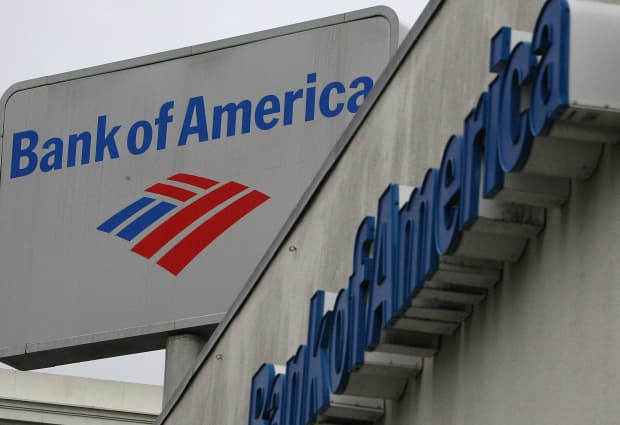This post was originally published on this site

Getty Images
Shares of Bank of America Corp. dropped Wednesday, after the bank reported a better-than-expected profit but revenue that fell more than forecast, while providing an upbeat outlook for net interest income next year.
“[W]e believe Q3 likely will be the bottom for NII and we are optimistic it will move higher in 2021.” — Chief Financial Officer Paul Donofrio in a post-earnings conference call with analysts, according to a FactSet transcript.
Net interest income (NII) is the difference between what the bank earns on its interest-bearing assets, like loans, and what it pays out in interest on liabilities used to fund those assets.
Here are some of the reasons for Donofrio’s optimism:
- Commercial and industrial loan demand could start picking up, as the economy is expected to “slowly grind forward.”
- Spending on credit cards is “slowly picking up,” with Chief Executive Brian Moynihan saying third-quarter customer spending has seen a “full restoration” of year-ago levels, which September spending higher than last year and October spending running about 10% ahead last year.
- Outstanding commercial and card loan balances, “at the very least” are not expected to see the “large declines” witnessed over the past two quarters.
- A combination of “refinancing fatigue” and a “stabilization” of longer-term interest rates should result in less bond premium write-offs that have weighed on NII.
- The deployment of cash through higher-yielding securities.
Earlier Wednesday, BofA reported that third-quarter NII declined 16.9% from last year, and fell 6.6% from the second quarter, to $10.13 billion, to miss the FactSet consensus of $10.24 billion. Total revenue dropped 10.8% from a year ago to $20.34 billion, below expectations of $20.8 billion.
The stock BAC, -3.98% dropped 4.1% in morning trading, putting it on track to extend the streak of disappointing earnings reports to four quarters. The stock dropped on the day earnings were reported for the past three quarters, by an average of about 3.7%, according to a MarketWatch analysis of FactSet data.
Meanwhile, net income was down to $4.9 billion, or 51 cents a share, from $5.8 billion, or 56 cents a share, but beat the FactSet earnings consensus of 49 cents a share.
CEO Moynihan also in effect called a post-pandemic bottom, by saying the second quarter saw the worst of the COVID-19 crisis in terms of customer spending. And in the third quarter, Moynihan said loan demand is stabilizing, “and we may have seen a trough in September.”
“As the economy continues to grind forward, we believe we see some demand recovery over the next few quarters,” Moynihan said, according to a FactSet transcript.
BofA’s stock has tumbled 32.1% year to date, while the SPDR Financial Select Sector exchange-traded fund XLF, -0.36% has lost 18.9% and the S&P 500 index SPX, -0.54% has gained 8.8%.

